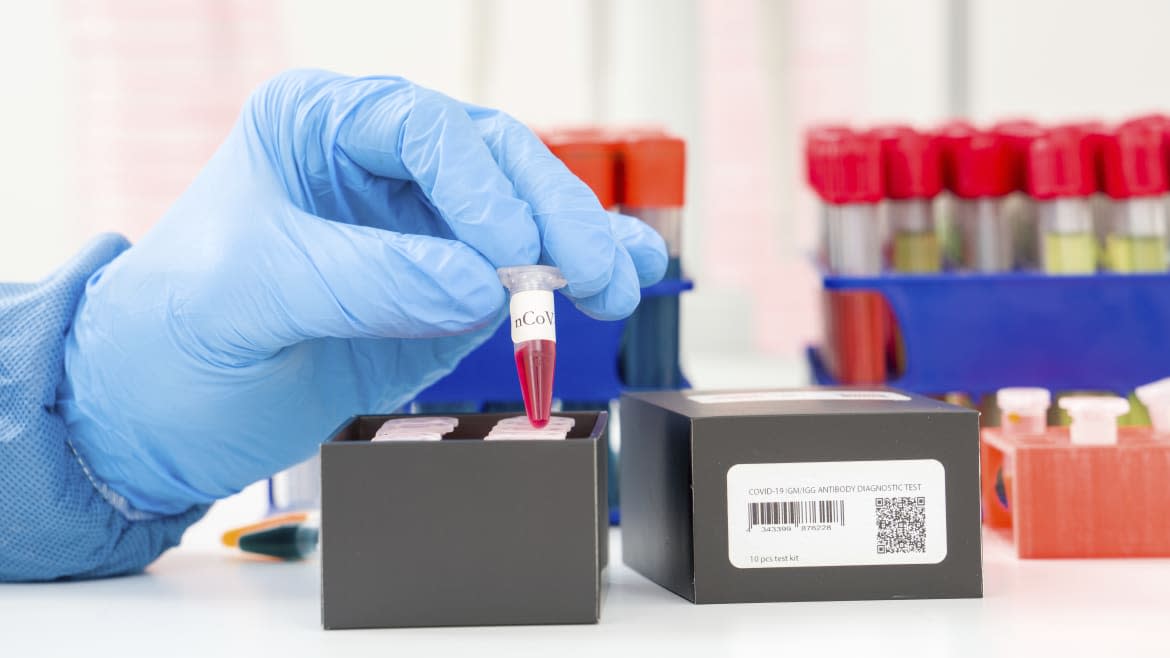Why This New COVID Antibody Test Could Unlock Mass Screening for Immunity

- Oops!Something went wrong.Please try again later.
The uptick in COVID cases these days is driven a lot of different factors—in great part the emergence of highly contagious variants like omicron and a drop in masking and social distancing rules, but also an overall waning in immunity for those who are vaccinated, which is no surprise. Antibodies, whether prompted by infection or vaccination, naturally taper off over a couple of months (or quicker depending on a person’s age and health). As COVID threatens to be a permanent house guest, scientists are starting to develop new ways to assess immune status quickly and easily.
Working toward that goal, researchers in Hong Kong have developed a device that allows someone to directly see their antibody levels following vaccination. The device, detailed in a new paper published Friday in the journal Science Advances, is on par with conventional coronavirus antibody testing platforms. It could be used as a better way to conduct mass screening for COVID immunity, to monitor someone’s immune status after the jab, or to even tailor vaccine dosing to an individual’s immune needs.
The most accurate antibody testing available right now requires blood samples that are analyzed in a lab. There are more convenient, at-home options that test your spit or nasal secretions. The problem with these more accessible kits is that they can only give you a yes or no and don’t factor in the level of antibody coursing in your body, Ting-Hsuan Chen, a biomedical engineer at the City University of Hong Kong and the study’s lead researcher, told The Daily Beast.
The new device, which can fit in the palm of your hand, consists of a small clear chip carrying two types of microparticles, tiny channels, and a little window to see the final result. One microparticle is magnetic and coated in the virus’s spike protein. The other is made of a compound called polystyrene and is studded with antibodies that attract anti-COVID antibodies, which typically target the spike protein.
Users just need to provide a few small drops of blood plasma from a finger prick. If COVID antibodies are present, they will attach to the polystyrene microparticles, which in turn will attach to the magnetic microparticles. The joined microparticles are magnetically separated from the single ones and collect in the little viewing window, called a particle dam. A little bar etched next to the side of the dam corresponds to the concentration of antibodies present as nanograms per milliliter.
Chen and his team tested out the device in 91 people who had received their second vaccine dose a few weeks prior. The team found that antibody levels were the highest for those who received an mRNA vaccine. But for everyone, antibody levels dropped off substantially after 45 days. These results were comparable to antibody tests done in a lab and were even better at detecting low levels of antibodies compared to at-home detection kits, which barely registered a positive.
Dogs Have Been Successfully Trained to Sniff Out COVID
It’s important to note that even though your antibody levels naturally decline, that doesn’t mean you outright lose the ability to make antibodies. After vaccination or infection, your body creates a memory of the antigen it learns to target and if it ever reappears, the immune system can quickly launch an attack.
However, Chen said it still takes time for your body to reactivate that memory and remake the necessary antibodies. In this situation, the new testing device could come in handy: During an outbreak, health agencies, clinicians, or people themselves could monitor antibody levels and see who among those previously vaccinated aren’t mounting a strong enough response and may need a booster shot. This could lead to more personalized vaccine dosing whether based on age—older people tend to not develop as robust immune responses after vaccination—or health status, such as if you’re immunocompromised.
Chen and his team are still working on making the device more accessible, such as making it capable of detecting antibodies in samples like spit or nasal secretions, which would make the device possible for home use.
“Our vision is to provide a device as simple as a rapid test but also provides as good accuracy as [conventional antibody testing],” Chen said. “I usually make an analogy to a mercury thermometer. It’s a device you can see and take temperature precisely without any equipment and that everyone can use. We hope our device can be like that, simple to use and everyone can read without any ambiguity to get the results they need.”
Got a tip? Send it to The Daily Beast here
Get the Daily Beast's biggest scoops and scandals delivered right to your inbox. Sign up now.
Stay informed and gain unlimited access to the Daily Beast's unmatched reporting. Subscribe now.

